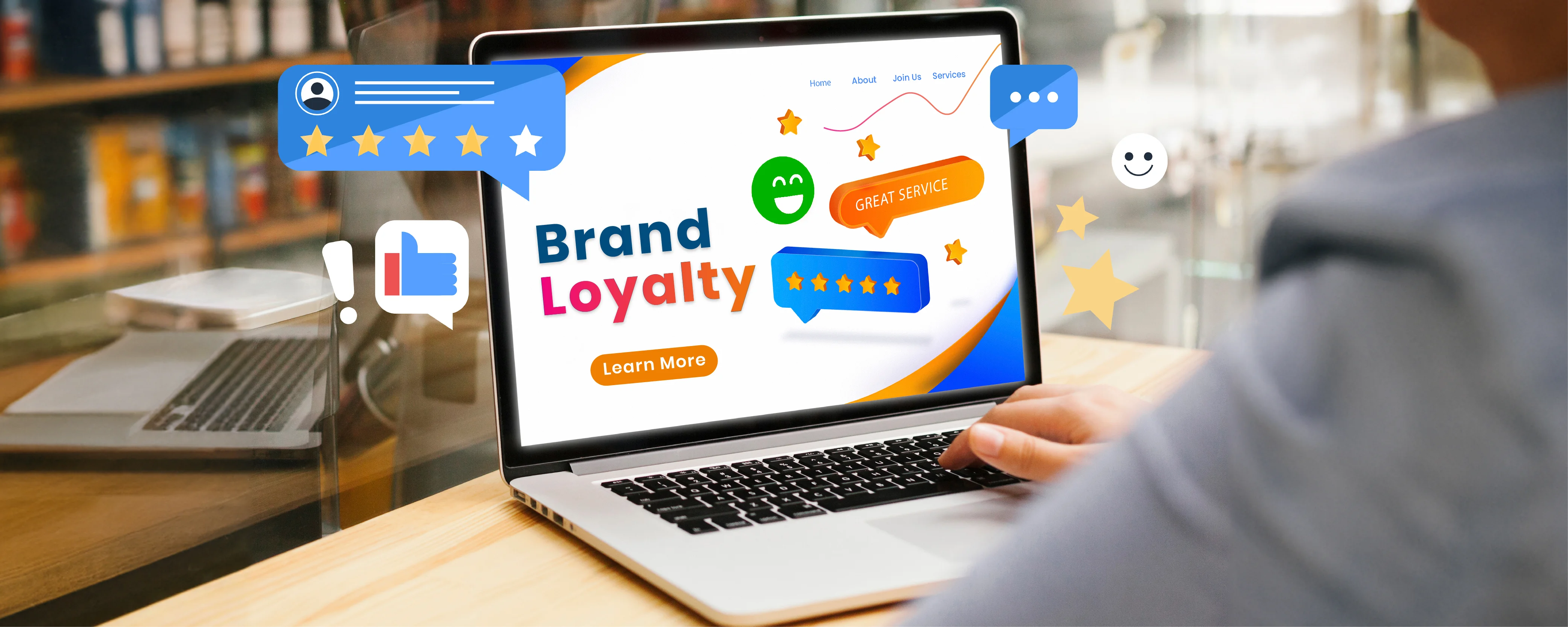Blogs
Services
Understanding Brand Loyalty: Importance, Types and Benefits
Jul. 04, 2024

When a customer sticks to your brand as the only option to procure what you sell, it's called brand loyalty. Indeed, it's an overly simple definition, but from a broader perspective, it is what it means. It is a great way to make your business more profitable and grow faster.
The center of attention when it comes to brand loyalty is the repeat purchases loyal customers make. But in reality, it has a lot of benefits and depth as a concept. In this blog, we will uncover its importance, types of benefits, and the strategy to make brand loyal customers. So, just stick to the end.
Why is Brand Loyalty Important?
Now that you understand what it is, let's shed some light on its importance. Starting from the basics, it is directly proportional to the growth of your brand and company. Yes, when you get customers who shop from you, and their overall experience remains great, it makes them loyal to your brand. So, it means that you will be getting repeat purchases from them. However, that's just half of it, as there are many more reasons that make it important.
So, when you make repeat purchases, you earn profits, but is it the same if you get ten repeat purchases and ten purchases from new customers? Not, and there lies the importance of brand loyalty. New purchases can be more expensive than repeat ones that cost up to 25 times. It is because of the costs related to acquiring new customers, which can even be zero in the case of brand-loyal customers.
On top of all this, you get free referrals from these customers, which even lowers the cost of acquisition of new customers. In contrast, it is a never-ending loop that only gets bigger if you keep the factors influencing it properly fine. It means keeping all the touchpoints from selling to post-purchase support optimum.
However, it itself is of various types. Based on the behavior of loyal customers, you can segment them into various types of brand loyalty, which is what we will talk about now.
What are the Different Types of Brand Loyalty
The types are important to understand because only one is perfect, and you have to strategize the shift from the other two types to that particular type.
1. Hardcore Loyalty
Hardcore loyalty is the perfect type, and you should shift your customers to this type. Wait, you will soon understand why. Hardcore loyalty means the customer is loyal to only your brand for what you sell. Let's say you have an apparel brand, and then a loyal customer of a hardcore brand will ship from you only for the apparel. An example of this type can be the majority of Samsung and Apple's customer base.
This type is best because you are having your competitors interfere, as the brand-loyal customers either do not look up to them or look at them as their competitors. So, you need to maintain their loyalty with strategies, which we will discuss soon.
2. Split Customer Loyalty
Now, some customers may love to buy from other brands, too. But if their options are very limited and you are one of them, then it's called split loyalty. In this case, loyalty splits between 2-3 brands, which means you are not the only one. But you can turn these customers into hardcore loyalists.
3. Shifting Customer Loyalty
Now it's time to discuss the third type, where the customers become loyal to your brand but shift after a time. It's different from churning as they may not leave you because of any inconsistency but may get bored of you. So, they don't have multiple brands at a time to shop from. They will find you and become loyal to your brand for a significant time, but then they may explore a new brand and turn loyal to them, leaving you behind. It can be difficult to turn them into hardcore loyalists, but attempting to do so is important.
What are the Benefits of Brand Loyalty?
Apart from growth in sales and revenue, there are other benefits too. Let's discuss some distinct benefits since we have already discussed the direct benefits, such as word of mouth, lower acquisition costs, etc.
1. Market Stability
Having a group of loyal customers provides stability for the business. These customers will likely stick with the brand even during tough times or economic downturns. This stable customer base helps the business maintain a steady income, making it easier to plan for the future and withstand market fluctuations.
2. Competitive Advantage
Customers who are loyal to a brand are less likely to switch to a competitor, even if other brands offer lower prices or promotions. This loyalty creates a competitive edge, making it difficult for competitors to remove the brand's customers. Strong brand loyalty ensures that the business retains its market share.
3. Brand Ambassadors
Loyal customers act as unofficial brand ambassadors. They wear, use, or display the brand's products, naturally promoting the brand wherever they go. Their genuine endorsement can influence others to try the brand, expanding the customer base without any formal marketing efforts from the business.
4. Emotional Connection
Customers who are loyal to a brand often feel an emotional connection. This bond makes them feel valued and understood by the brand. Such a relationship increases their overall satisfaction and makes them more likely to stick with the brand long-term.
5. Reduced Sensitivity to Price Changes
Loyal customers are less likely to be swayed by price changes. They value the brand's quality and experience over lower prices offered by competitors. This loyalty means the business can maintain its pricing strategy without losing its customer base, even if prices need adjustment.
Strategies for Building Brand Loyalty among Your Customers
1. Understand Customer Journeys
2. Improve Customer Experience
A positive customer experience is crucial. Provide excellent customer service by training staff to be friendly and responsive. Ensure your website is user-friendly and that the purchasing process is smooth. Personalize interactions based on customer data to make them feel valued. Listen to their feedback and act on it to show you care about their opinions. And to measure the customer experience of your brand just click here.
3. Reward Loyal Customers
Show appreciation to loyal customers through rewards. Create a loyalty program where they earn points for purchases, redeemable for discounts or freebies. Offer exclusive benefits, like early access to sales or special events. Simple thank-you notes or surprise rewards can also make customers feel special and valued.
Conclusion
In conclusion, brand loyalty is a cornerstone of long-term business success. By understanding its importance, recognizing the different types of loyalty, and implementing effective strategies, businesses can cultivate a loyal customer base that drives sustained growth and stability. Prioritizing customer satisfaction and creating meaningful connections with customers is key to fostering loyalty.
When a customer sticks to your brand as the only option to procure what you sell, it's called brand loyalty. Indeed, it's an overly simple definition...
